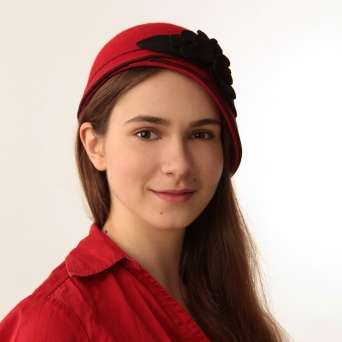The Adventures of Vixen Sharp-Ears or The Cunning Little Vixen (West Edge Opera projected both titles) is unlike any of Janáček’s other operas – or any composer’s operas. Based on a comic strip, it shows a series of episodes in the life of a fox, from her capture by a forester, through her escape and love life, to her death. For an opera, it contains little singing: the scenes are punctuated by long orchestral interludes where Janáček’s rich music shines.
The result is atmospheric and dreamlike – an effect enhanced by West Edge Opera’s venue, a dark abandoned train station. With Kevin August Landesman’s lighting, a whole side of the station becomes a forest of shadows. Projections help the wooden trees in the foreground cycle through the seasons to indicate the passage of time. Liz Tenuto’s balletic dancing as the Dragonfly creates smooth transitions. Brechtian titles projected before each scene (for instance, “Sharp-Ears’ Courtship and Love”) emphasize the episodic nature of the plot.
Janáček’s libretto gives the forest animals human problems: gossip, home ownership, and married life, to name a few. Christine Cook’s costumes further highlight the humanity of the characters, sometimes to the point that it’s difficult to tell which animal a singer is playing. The Vixen sports a red leather jacket and red dreadlocks with pointy ears, and her punk look is complemented by a penchant for spray painting on trees. The Mosquito steals human blood with a syringe and daintily sips it from his cup. The Dog’s identity is indicated only by his floppy-eared aviator cap.
Almost without exception, the singers show great talent. As the titular Vixen, Amy Foote is a stage animal, walking and crawling with lithe grace. Her tail and ears seem a natural part of her, and the emotion on her face and in her voice make her easy to sympathize with. Her piercing soprano carries beautifully over the orchestra. She is well matched by her handsome Fox, sung in velvety tones by mezzo Nikola Printz. Printz‘s Fox combines bad-boy charm with courtly manners; it’s no wonder the Vixen is swept off her feet.
Completing the trio of leads is Philip Skinner as the gruff Forester. Skinner delivers his lines more conversationally than operatically, though his lyrical moments prove the strength of his bass voice. His dramatic choices betray a deeper, more feeling character than his words imply. Other notable performances come from baritone Nikolas Nackley (comically similar as the aristocratic Badger and the lovesick Parson), tenor Joseph Raymond Meyers (fierce and funny as the Mosquito, morose and sentimental as the Schoolmaster), and mezzo Deborah Rosengaus (sparkling in voice and droll in demeanor as Lapak the Dog in heat). Baritone Carl King’s uneven tone mars his Harasta, though he makes up for it with his commanding stage presence.
For a small opera company to put on a piece with a chorus is a challenge, but West Edge smartly chose to collaborate with the Volti Chorus and the Piedmont East Bay Children’s Choir rather than recruit their own choristers. The Volti Chorus seemed much larger than their eleven members: the voices were both distinctive and blended, producing a beautiful, full sound. Three choristers ably filled small solo roles—most notably Leandra Ramm, whose clear soprano and exaggerated strut were perfect for the rooster. The Children’s Choir enchanted with fresh, chirping voices, committed physicality, and delightfully uncoordinated dancing. It’s hard to imagine a more adorable opera ensemble than young children playing baby animals.
The sixteen-piece reduced orchestration by Jonathan Dove preserves the exciting textures of Janacek’s score. Under Jonathan Khuner’s baton, the musical world of the forest was lush and engrossing, with shimmering from the percussion, booming from the brass, and aching lines from the strings. Volume balance can be tricky with Janáček scores, but the orchestra was admirably restrained, and all of the adult soloists were consistently audible. (The children did not fare as well.)
West Edge Opera’s Cunning Little Vixen doesn’t provoke tears. But to hear Janáček’s score delivered by such an orchestra and cast is a magical experience.




